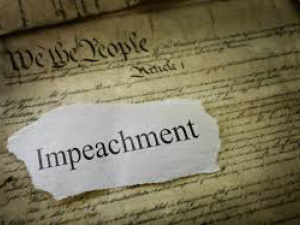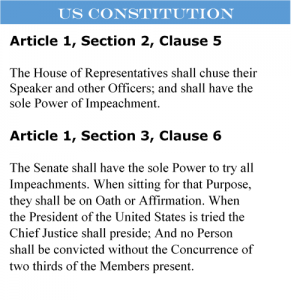
With all the buzz around Washington DC, most offices and coffee shops around America talking about “impeachment” I thought it might be useful to remind everyone what this is and what it is not. Impeachment is many things, but rarely what most folks think it is.
Impeachment is a Constitutionally prescribe process that allows the President of the United States and other Federal office holders, to be accused of a high crime or misdemeanor in the US House and then to be tried for those charges in the US Senate. The trial in the Senate is not like we see on Law and Order, or even what you and I would face were we on trial for a crime.
I also want to clear up one other important point. An impeachment inquiry process and subsequent vote in the US House is not called for by the Constitution. Articles of impeachment are required to be voted on, under the Constitution, with a 50% plus one majority necessary for the impeachment to go forward.
The impeachment inquiry vote we have heard so much about over the last few weeks in Washington was about following the prior, modern rules of engagement for impeachment. The impeachment inquiry vote process was used when impeachment was considered against President Nixon and ultimately occurred against President Clinton.
What does impeachment mean? It is simply this. The target of the impeachment vote, should the vote prevail, is formally accused of a crime, and should the person be convicted in the Senate of those charges, can be removed from office.
 What is an impeachable offense? The US Constitution says an impeachable offense is treason, bribery or other high crimes or misdemeanors. The truth is, an impeachable offense is whatever you can get 50% plus one of the US House members to agree on at any moment in time.
What is an impeachable offense? The US Constitution says an impeachable offense is treason, bribery or other high crimes or misdemeanors. The truth is, an impeachable offense is whatever you can get 50% plus one of the US House members to agree on at any moment in time.
Once impeached, the person will face a trial in the US Senate. The trial will be presided over by the Chief Justice of the United States Supreme Court.
The impeachment managers from the House will put on their case against the individual in the Senate trial. The defendant will then get to argue their defense. Traditional rules for evidence and what may or may not be presented is not like a standard jury trial for an average American.
This is a political process and the rules are very different. Ultimately, the Chief Justice will decide what can and can be presented or done.
When the trial concludes, the US Senate will vote on each Article of Impeachment. In order for the defendant to be convicted of the charge, the yes vote must garner 2/3s of the members in the US Senate. Today, that number stands at 67 votes for conviction. Anything less and the Article of Impeachment is thrown out.
As we head toward what appears to be another impeachment of a President, this time President Donald J. Trump, I thought it would be good to refresh our memories. Impeachment is a very serious business. It effectively means, if successful, that Congress is overturning the will of the people at the ballot box. This should never be taken lightly and should only be used sparingly, against the most egregious circumstances.

Ray Richardson is the host of the Ray Richardson Show on WLOB Radio. He has authored three books, his new book, Truth About Trump is on Pre-sale now, written a newspaper column for over a decade and is a contributor to Richardson Magazine.
Ray lives with his wife of 34 years, Dee Dee, in Westbrook Maine. They have four grown children (8 when you count the spouses), and blessed with one granddaughter.







